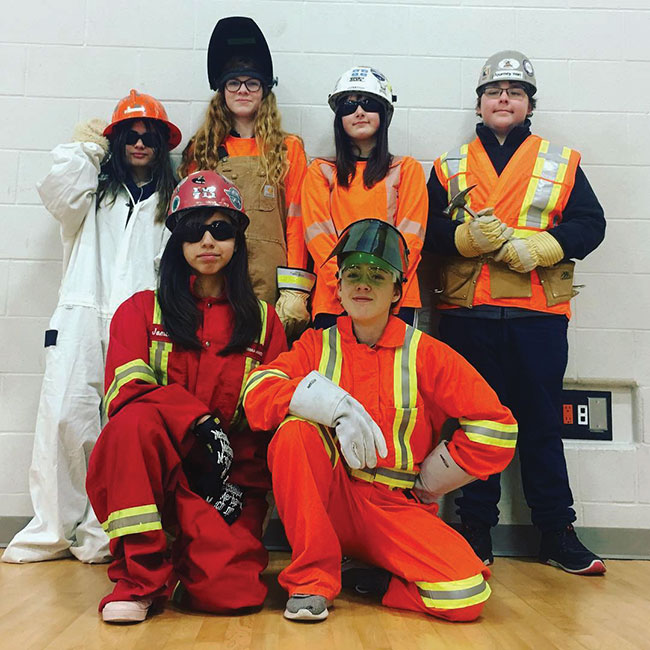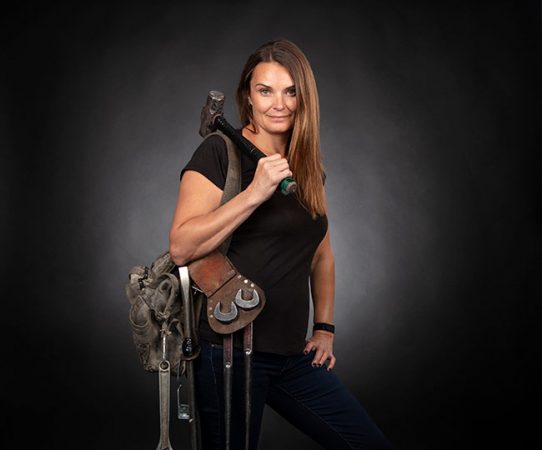
Features
News
Business
Staffing
Engaging the next generation: Q-and-A with Jamie McMillan of Kick Ass Careers
Kick Ass Careers shines the spotlight on the skilled trades as a solid career path
May 3, 2021 By Carolyn Camilleri
 Kick Ass Careers is an organization that aims to get youth interested in the skilled trades. Founder Jamie McMillan travels from school to school across North America. She shows up with tools and equipment, gets kids dressed up and brings young volunteers up on stage with her, dressed up in construction gear, as part of her presentation.
PHOTO COURTESY KICK ASS CAREERS
Kick Ass Careers is an organization that aims to get youth interested in the skilled trades. Founder Jamie McMillan travels from school to school across North America. She shows up with tools and equipment, gets kids dressed up and brings young volunteers up on stage with her, dressed up in construction gear, as part of her presentation.
PHOTO COURTESY KICK ASS CAREERS Contractors looking to get young people interested in drilling, pump installing and other trades related the groundwater industry can pick up valuable ideas from an inspiring promoter of the skilled trades.
Jamie McMillan, the founder of Kick Ass Careers, is on a mission to “engage, educate, and encourage” youth to consider careers in skilled trades. She presents to thousands of students, parents, educators and employers each year across North America in person and online, and she has an international following. She also volunteers with a number of organizations, including Skills Ontario and the Skilled Trades Advisory Committee.
And she speaks from experience.

Jamie McMillan, founder of Kick Ass Careers presents to thousands of students, parents, educators and employers each year across North America. She also volunteers with Skills Ontario and the Skilled Trades Advisory Committee, among other organizations. PHOTO COURTESY KICK ASS CAREERS
McMillan is a journeyman ironworker and apprentice boilermaker, a career she embarked on in 2002, when women represented just two per cent of the workforce across Canada and the United States.
In her own youth, she wasn’t drawn to the ivory towers of academia and faced challenges choosing a career she could sink her teeth into. Back then, opportunities in the skilled trades didn’t come from high school. The seed that grew into McMillan’s career came from a chance conversation that changed her life. It also made her very determined to share what she knows about skilled trades with youth – that skilled trades come with good job prospects, income and security.
YOU DO A LOT OF WORK SPEAKING IN SCHOOLS AND TO GROUPS FROM DIFFERENT INDUSTRIES. HOW IS THAT EXPERIENCE NOW THAT THE WHOLE WORLD HAS GONE ON ZOOM?
Well, it was challenging. Usually at this time of year, I’m on the road, and I travel probably about 20 to 25 weeks a year from school to school across Canada and the United States, and I go to big conferences. When I go to schools, I bring tools, equipment, and I get kids dressed up. I have a photo booth. It’s super engaging. I get on stage. I bring kids as volunteers with me, and I get them dressed up in construction gear and make them part of my presentation and then boom – COVID hit. I flew back home [to Hamilton, Ont.] March 13, the day the border closed.
With COVID, it was a challenge because I had to go from being a very engaging speaker in person with all this fun stuff to make the kids like me to now being online. And in the beginning, it was really rocky, but I work a lot with the Ontario Youth Apprenticeship Program and Skills Ontario. They have been really good at helping me, and through them, they would link me up with the teachers, and I would speak to the classrooms or I’d speak to the kids at home. And I ask for their feedback. Every time I get constructive criticism or suggestions, I change it up. Now I think I’ve pretty much nailed it in the way the students want.
HOW HAS COVID-19 AFFECTED THE SKILLED TRADES AND ATTITUDES ABOUT THE SKILLED TRADES?
Well, a blessing of COVID is that it proved to the entire world that we need skilled trades. Because when everything else was shutting down, the essential jobs were keeping our infrastructure, building and maintaining – you can’t just stop maintaining all of that stuff. You can’t just stop building housing with the growing population. You can’t just shut down steel plants. They need to run because if you shut everything down, it’s going to seize up. Even the nuclear plants, you can’t shut those down. We need electricity and plumbing and road maintenance. I think government and educators are now saying, ‘OK, skilled trades are actually important.’ It’s changing the mindset and that’s a good thing.
HOW CAN SKILLED TRADES, AND PARTICULARLY WATER WELL DRILLING, ATTRACT MORE YOUNG PEOPLE?
If you want to attract youth today, you have to make it look cool. You have to show other youth succeeding in it. You have to get information really fast and short out there. I’m part of a federal advisory committee for promoting skill trades as first choice pathways to youth. Because I’m in the schools working every day with youth and talking to them, I’ve asked, ‘How is it that you want us to promote this industry to you to make it look cool to you? What do we have to do?’
If you’re trying to attract a younger generation, your first steps are always going to be to talk to that younger generation. You want to find out what you can do to help them understand it in their terms. And the truth is, nowadays kids don’t like anything unless it’s fast information – big, bold and fast. It’s got to be sexy cool. They want one-minute Instagram videos, showing young people who are succeeding in this industry.
It’s like me when I go to these rural communities, like Fort McMurray, and I have to live in camps. What about that is cool? What makes you want to go and do that? Do you make a lot of money? Are there bonuses? If you spend this much time doing this, how is it going to affect your life over here and make this part of your life better? And it has to look cool. If you want to talk to youth about it, you have to show them what the incentives are and why it would be so great to work in that industry.
WATER WELL DRILLERS AND PUMP INSTALLERS OFTEN WORK IN RURAL AREAS OUT IN NATURE, AND WATER WELL DRILLING IS ENVIRONMENTALLY SOUND – THAT HAS APPEAL, DOESN’T IT?
Oh yeah, definitely. For example, maybe targeting the kids that like to be out in rural areas, and maybe, after work, want to go fishing in that lake that’s never touched. There are a lot of those kids out there, like my nephew who likes hunting and fishing. In my opinion, those careers open up all types of opportunity for that lifestyle.
WHAT ARE SOME OF THE ‘MUST-HAVES’ AS FAR AS MAKING A JOB APPEALING?
For job appeal, for most of them now, it’s the money. It’s always going to be the money. That’s where you grab their attention. The ability to travel, the lifestyle that they can have from the money they make. You really have to show you can make this much money here.
When I talk about going Fort McMurray, I had a partner that was with me. He was a 21-year-old apprentice. And he would work two weeks in, one week out. Imagine having a one week vacation every two weeks? And at 21 years old, this kid was working two-thirds of the year making $112,000.
By the time he was 25, he saved up and bought a house. He didn’t need a mortgage – just bought the house. And that’s where you have to draw the appeal, because just telling them they’re going to go out and work in this rural area and their life is going to be out in the bush and alone might not be as appealing to them as if you’re showing the lifestyle they can have with the money they make.
ANY OTHER SUGGESTIONS FOR THE WATER WELL DRILLING INDUSTRY IN GENERAL?
The thing I really strongly suggest if there is some apprenticeship aspect to it, is to consider the Ontario Youth Apprenticeship Program. They have 144 different trades that they promote through the Ontario Youth Apprenticeship Program. Get that into their curriculum and, potentially, there’s a program that can be built off of it so kids in schools who are interested in this can start doing co-ops and getting hands-on experience.
Learn more about Kick Ass Careers at kickasscareers.org and by watching Our Niagara TV’s March 9, 2021, episode of The Source, when Jamie McMillan was interviewed in-studio by Mike Balsom.
Carolyn Camilleri is a Toronto-based writer, editor, and content strategist. She has been writing for consumer and trade magazines, as well as businesses and organizations, for more than 15 years.
Print this page